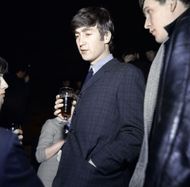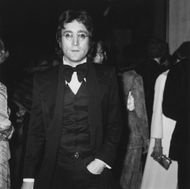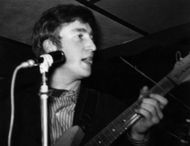The impact of John Lennon reaches far beyond his endeavors in The Beatles. He was a musician who employed music as an interpretation of the world's paradoxes and complexities. His songs, both as a band member and solo performer, were frequently deeply personal but also universally relatable, merging personal observation with social commentary.
Instead of depending on smooth production or business models, John Lennon's strength lay in bringing feeling into his songs and belief into words. Albums such as Imagine and Working Class Hero were not just about the music, they were announcements, confessions, and defiance of the status quo.
The reason his songs remain current is not so much the sound as the courage behind it — courage to challenge war, challenge power, confess not knowing, and pursue utopia. John Lennon's music continues to be strong because he can be vulnerable yet a revolutionary too, giving us an artist who never lost faith in pursuing truth in his art.
Following that tradition, John Lennon's post-Beatles career was also a departure in which his music was more intimate, raw, and emotionally bare. No longer writing as a part of a group, he employed his solo career to express personal pain, disillusionment, and hope with unflinching candor. Songs such as Mother, Imagine, and Jealous Guy expressed a vulnerability and openness that had only been suggested in his previous work.
These tracks weren't recorded to be fun. They were confession, introspection, and ire transmitted through minimalist beats and ambient synths. John Lennon wasn't a pop idol anymore, he was a man dealing with his own history, challenging the world at large, and seeking harmony in his songs.
This period of his life revealed not only his wealth as a composer, but also that he desired to lay it all bare.
Disclaimer: This article is purely based on the writer's opinion. Reader's discretion is advised.
Here are the top 8 songs of John Lennon
John Lennon's catalog is rich in the kind of songs that go from emotional resonance to political urgency to timelessness. It is difficult to number such a wonderful canon, but some stand out because of their cultural impact, lyrical depth, and timeless appeal.
They are the ultimate subset of John Lennon's solo work, cocky, self-analytical, and ahead of its moment. From anthemic declarations to the world to ballads that reflected his inner turmoil, these eight tracks are the most representative moments of his solo career.
1) Imagine
Released in 1971, John Lennon's Imagine has been a quiet but forceful call to the establishment for decades. More measured than an outburst of protest, John Lennon offers a vision, an invitation to imagine a world free from things that divide us: national borders, organized religion, and commodity fetishism. Its strength is in its own simplicity, a spartan piano progression married to lyrics that offer radical questions in a soft package.
What if humanity could live without the things that so often lead to conflict? John Lennon’s tone is reflective rather than preachy, almost self-aware in its idealism, as he sings,
"You may say I’m a dreamer. "
And yet, it is this very dreamlike quality that has allowed Imagine to remain relevant over the decades, serving as a go-to anthem during times of global unrest or collective grief. Cut by hundreds of others but never subsidized in any official manner, the original alone matters, true, bare-bones, and quietly powerful.
Imagine never gives us solutions, but it gets us to wonder if, maybe, it might. It survives not because it tells us the world is simple, but because it challenges us to imagine what we might.
Read More: Justin Bieber’s evolution: A journey through music and fame
2) Jealous Guy
Jealous Guy, the album cut from John Lennon's 1971 Imagine, records one of the most openly emotional moments in his post-Beatle life. Composed originally as Child of Nature during The Beatles' Indian visit in 1968, it evolved into a re-finished lyrical form as an incredibly intimate bereavement. Different from some of John Lennon's more experimental or political writing, this song finds him laying bare his vulnerable self, discussing the self-destruction of jealousy and the pain it inflicted on him in relationships.
With soft, on-the-brink-of-dainty accompaniment and a plaintive, melancholy melody that floats on unspoken sorrow, the song is a confession and not a performance. John Lennon does not just apologize for his mistakes, he lays them bare with terrible honesty, leaving us to the familiarity of individuals close to us, for more than 40 years now.
Never officially released as an American single until several years following its initial appearance, Jealous Guy is one of his most recorded and best-selling songs, celebrated for its honesty and emotions. It is marks crescendo among his writings, where his pen did more than turn toward poetry, but became the portal to his conflicted humanness.
3) Mind Games
In 1973, Mind Games heralded a new era in John Lennon's solo career — one that was less protest-oriented one, and more of introspection, idealism, and personal transformation. Moving away from the raw emotional material of his earlier solo work, John Lennon wrote a song that was more of a calming call to action, calling people to stand with him as he summoned in notoriously inflammatory language, "mind guerrillas."

It was all about seeing differently, sharing love, and employing mental clarity as a weapon of individual and social progress. The words of the song mix loose spiritual abstraction and tough hope, evoking a vision of global harmony starting on the level of the individual. The sound of Mind Games mixes filmy psychedelia, mellow funk, and brassy rock foundations, and the sound picture is a vision of the message. It is dreamy but firm, resolute but gentle.
In contrast to some of John Lennon's more aggressive work, this song straddles the line on the side of optimism, placing love and self-discovery as acts of revolution. By doing so, John Lennon created a song that continues to stand the test of time, years after its release, as a reassuring hymn for those who are looking for meaning, peace, and harmony in an otherwise crazy world.
4) Mother
Mother, the agonized opening song of John Lennon's solo career in 1970, Plastic Ono Band, marks one of the emotionally-stripped moments of his life. Bereft of production sheen or glitz of the studio, the song is stripped down to essentials with giant notes of piano, bass, and drums, to leave space for John Lennon's vocals and agony. The song is a reaction to the trauma of his battered childhood, and his ambivalent relationship with his parents.
He forced his father out of the house when he was young, and although he was dear to his mother, Julia, she was brutally killed in an accident when he was a teenager. These repressed feelings come back with feral innocence in lines such as,
"Mother, you had me, but I never had you" and "Father, you left me, but I never left you."
Each of such lines is repeated in growing desperation throughout the song.
![John Lennon [R] with George Martin during a recording of The Beatles in 1964 (Image via Getty)](https://statico.soapcentral.com/editor/2025/05/5619a-17469415836492-1920.jpg?w=190)
John Lennon's raw screaming at the end of the song isn't performance or acting. It is catharsis. Mother offers loss in its most repellent guise — naked, unadorned, and brutally human.
The album failed to chart, at least apparently so, and the reason assigned was that it was too emotionally charged. However, its legacy is not because of its commercial viability, but due to its candor. It was a watermark on John Lennon's career, the start of an album and art phase, characterized by experimentation, introspection, and eschewing pretension.
With Mother, John Lennon wasn't unmasking something, he was cutting loose years of pent-up pain. By doing so, he opened doors to the backrooms of his rehab.
5) Watching the Wheels
Released in 1980 on his Double Fantasy album, Watching the Wheels is a sentimental highlight of John Lennon's career, as he reminisces about giving up the music industry and living a more private life. Having been absent from the music scene, raising his son Sean, John Lennon re-enters the music scene with a track that radiates joy and personal growth.
The acoustic-based, soft melody of the song is perfectly adapted to the introspective mood of its lyrics, wherein John Lennon reminisces about the tranquility he experienced from his time out of the limelight. Rather than bemoaning the insanity of fame, he laments a peaceful liberty, seeking comfort in getting away from the spotlight.

His smooth, assured tone sends a deep sense of fulfillment, broadcasting a message of freedom from the tension and constant observation of his former existence. Owing to its plain yet deep language, Watching the Wheels is a serene contemplation of the importance of obtaining equilibrium and satisfaction in the smaller, less boisterous aspects of life.
6) Working Class Hero
Released in 1970 on John Lennon/Plastic Ono Band, Working Class Hero is one of John Lennon's most forceful criticisms of class exploitation and social injustice. The minimalist acoustic accompaniment removes everything extraneous, reflecting the harshness and directness of its message.
With a sparse instrumentation, the emphasis is all on Lennon's impassioned voice and his stinging, biting lyrics. He sums up in a few words the profound agonies of the working class, suggesting the psychological and emotional toll of living in a system of restriction and conformity.
Lennon's voice pierces the conformity of society to expose the hypocrisy and agony of conforming to a system that, from birth, crushes individual freedom. The rawness and unflinching honesty of the song make it a highlight of Lennon's post-Beatles career, as a personal manifesto and as a resilient anthem of rebellion, and defiance against social wrong. Its repeated relevance in later times testifies to its worth as protest fare, calling out the wrath of those excluded by society.
7) Instant Karma!
Instant Karma! is one of the most spontaneous and powerful songs of John Lennon, composed in 1970, just 10 years after he conceived the idea. The song was composed so hastily that it actually recorded the raw energy of the time. With its catchy beat, energetic tempo, and strong rhythm, the song was a one-night success, creating a new benchmark for how rapidly a song would be written and put out.

The message is straightforward but emphatic: Our decisions have immediate and undeniable consequences. Lennon's passionate vocals, accompanied by strong piano and rock-like beats, make the point indubitably. Instant Karma! is not just reciting a private opinion; it calls for examination and accountability in those who hear it.
The insistent pace and compelling melody of the tune made it an appeal for personal reflection, demanding the listeners consider their conduct amid life's tumult. As both a musical and philosophical statement, it remains true as an admonishment that the energy we send back into the world comes rushing back.
8) Happy Xmas (War Is Over)
It was a 1971 mix of Christmas cheer and political consciousness: Happy Xmas (War Is Over) by Lennon and Yoko Ono. Technically not a Christmas song, it is an impassioned call for peace at the height of the Vietnam War. The mythic chorus War is over, if you want it captures the couple's sincere dedication to social revolution and anti-war activism, calling audiences to a decision about whether they are members of those who exist in peace.

The flashy production and children's chorus create the luminous, celebratory mood of the song, a utopian counterpoint to its somber subject matter. While it was an anti-war song when the song was originally written, hope and unity in the song's message have lasted longer than the meaning of the song and have become a holiday staple.
Its combination of activism and holiday cheer has convinced decades of fans, whose universal message of peace continues to resonate long after the holiday season.
John Lennon's music continues to reflect his genius at weaving introspection and universal principles. Through both his time with The Beatles and as a solo artist, his songs cut across genre boundaries, inciting cultural shifts and exploring deeply human themes: peace, love, and contemplation. His lyrics have continually encouraged listeners to look inward into the world, challenging expectations while leaving room for hope and vulnerability.
His ability to balance political activism with his vulnerability gives his music staying power. From his patriotic anthems to his soul-searching ballads, Lennon's songs remain inspiring, inciting, and resonant, affirming his place as one of the greatest, most far-sighted performers in the history of music.
Keep reading SoapCentral for more informative content!
Also Read: Beyoncé through the years: Hit songs, high notes, and herstory
